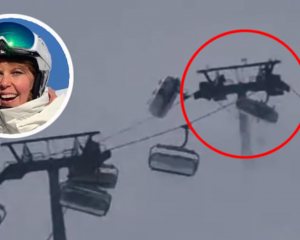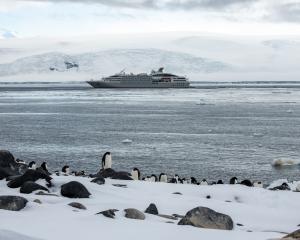It was on the beachfront at the up-market French Mediterranean resort of Beaulieu-sur-Mer that our lives very nearly came to an end.
We'd been standing on the kerb at a zebra crossing, waiting for the traffic to stop for us to cross, when finally a driver did so.
But as we stepped off the kerb, a motorcycle carrying a pillion swerved and accelerated around the stationary car, crossing the unbroken centre line and zooming ahead in front of us, disappearing in a cloud of exhaust and a guttural roar.
Welcome to France, a place where the pedestrian apparently has no rights, and zebra crossings simply are insignificant paint on the roads.
Crossing the street in France is a game of chance and bluff: you try to bluff the drivers that you're crossing whatever they do, and you take the chance that they will have a conscience after all and at least slow down.
But it's not just in France that motorists are arrogantly dismissive of pedestrians.
It's a cultural phenomenon in Europe.
But in France, they do it with more panache.
This is one of the lessons the visitor must learn in order to survive in Europe.
Here's another: Europe is a paradise for gaspers.
If you don't like strangers blowing smoke into your face, crowding your space with carcinogenic particles, then beware.
Particularly in Switzerland, of all places.
Known as an urbane, go-ahead kind of place, Switzerland is one of the few countries in Europe yet to impose bans on smoking in bars and restaurants.
More restrictive smoking laws are on the drawing board but, right now, eating and drinking in Switzerland will subject you to constant chuffing and gasping.
This is particularly an issue in Europe given how many bars, cafés and restaurants are of your small, intimate variety.
In Germany, the anti-smoking movement suffered a recent setback when higher courts ruled against them in several states on the basis of protecting the business of cafés and clubs that consist of just one room, for which it is difficult to set aside a separate room for gaspers.
Gasping is the European community's national sport.
Even with bans in place in many countries, the place is rife with chuffers happily and carefreely blowing smoke in your face.
In cafés and bars, anywhere within sight of the footpath and street seems their territory.
In Europe, smoking is seen as an issue of the civil liberties of the gasper rather than the issue of public health of the community at large, or the civil liberties of the unfortunates in the vicinity who cop the smoke.
There are other downers, too.
To highlight them is not to be negative.
It is to help you prepare for the issues you will be confronted with on the Continent.
A Scottish friend says that, when he and his American wife had considered buying an apartment in Beaulieu, the two downers they contemplated were gasping, and dog poo.
Dog poo is pervasive.
Again, there is a growing awareness of it, and doggie bins are scattered sparsely about some areas.
But there are enough locals who just don't care to make it a downer.
The corollary of dog poo, apart from the risk of standing in it, are the flies it attracts, which then set about settling on your food.
And, in Europe, you know where they've been.
The Curse of the Reclining Seat is a downer en route.
Most will be familiar with the passenger who, as soon as the seatbelt sign dims after take-off, reclines his or her seat to the maximum.
The passenger behind finds their body room diminished, the in-flight entertainment screen sitting almost flush on the end of their nose.
Dinner trays become impossible to manage, drinks spilling on to the lap.
The passenger who caused the problem, of course, remains indifferent to your plight.
Some even resist when the cabin crew approach them to raise their seats for the meal service.
To cope with the reclining passenger, the passenger behind must recline their seat, too, creating a domino effect all the way back along the row, each affected passenger blaming the one directly in front of them.
Then there is the Oblivious Backpacker - the tourist who carries their gear for a day of sightseeing in a day pack on the back (or, often these days, in fear of pickpockets, on the chest).
The tourist who carries the backpack does so for efficiency and convenience: they get to carry more than they really need for the day, close by but out of the way.
What they don't realise is that even a relatively small day pack when full is about 1.5 times the thickness of the average human body.
In a crowded train, or before a congested city map display, the Oblivious Backpacker turning suddenly is likely to take out two or three tourists, the babies they're carrying, anyone in a wheelchair, and a few small children.
And still be oblivious to it.
The need for the backpack on the chest stems from the pickpocket.
Many cities warn of pickpockets, although a reasonable degree of care can protect you; you don't need to make yourself look like an idiot by wearing a backpack on your chest.
In Europe, we managed each day with a normal handbag (for the ladies), and a wallet and digital camera carried in the front pockets (not the back pockets).
This was a ploy to appear as locals, for the threat of pickpockets is said to diminish the more one looks like a local, not to mention the more one frequents locals' places, not tourist haunts.
In France, there also is the Curse of the Non-French Credit Card.
These days, you can get cash and pay for things with your credit and debit cards from pretty well any ATM in Europe, but there is an important exception to this in France.
Financial transaction machines in France that are associated with government organisations will not accept credit and debit cards issued by banks that aren't French.
You can get your money from a bank ATM, but you can't buy tickets from dispensing machines at railway stations, for example, and you can't rent pushbikes from the proliferation of Velo stations around French cities.
Apart from all this, have a nice day.
Bon voyage.
- Paul Ellercamp and Suzanne Hunt












